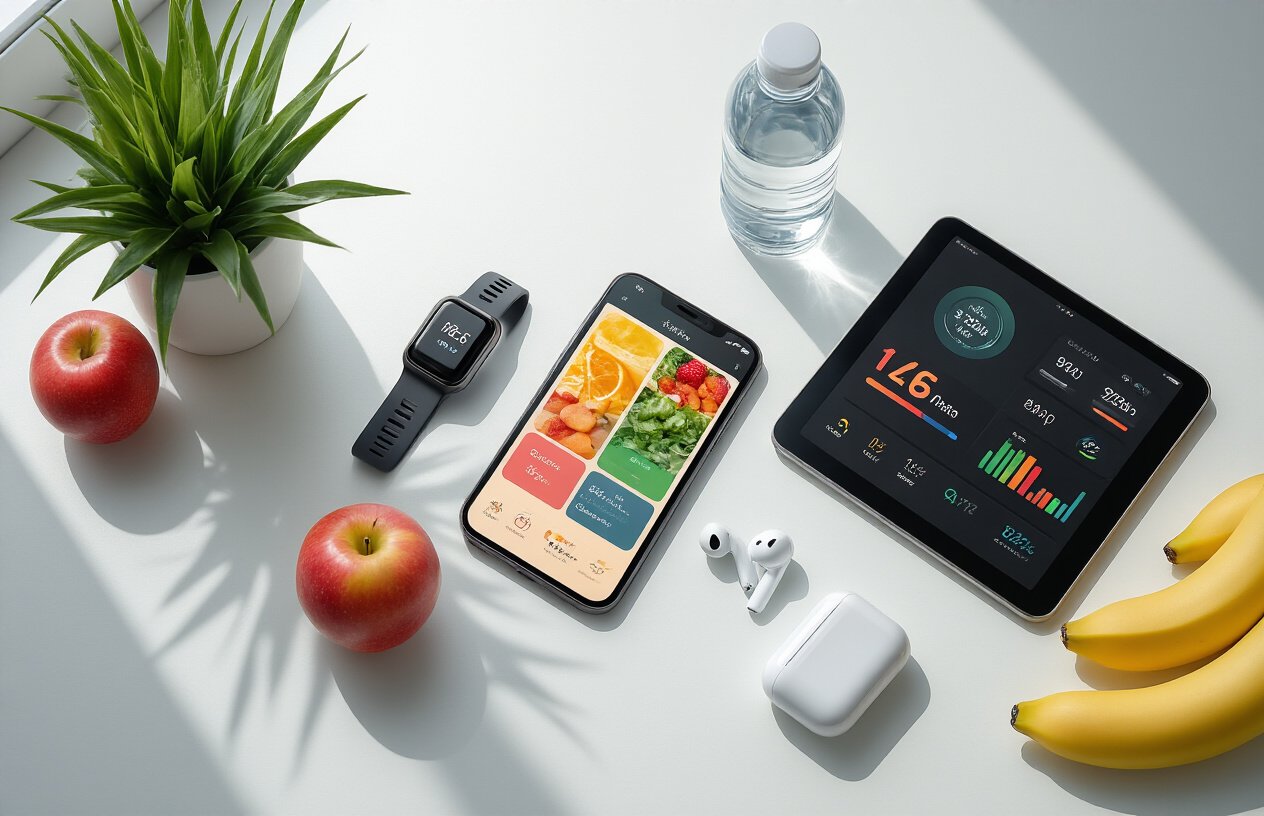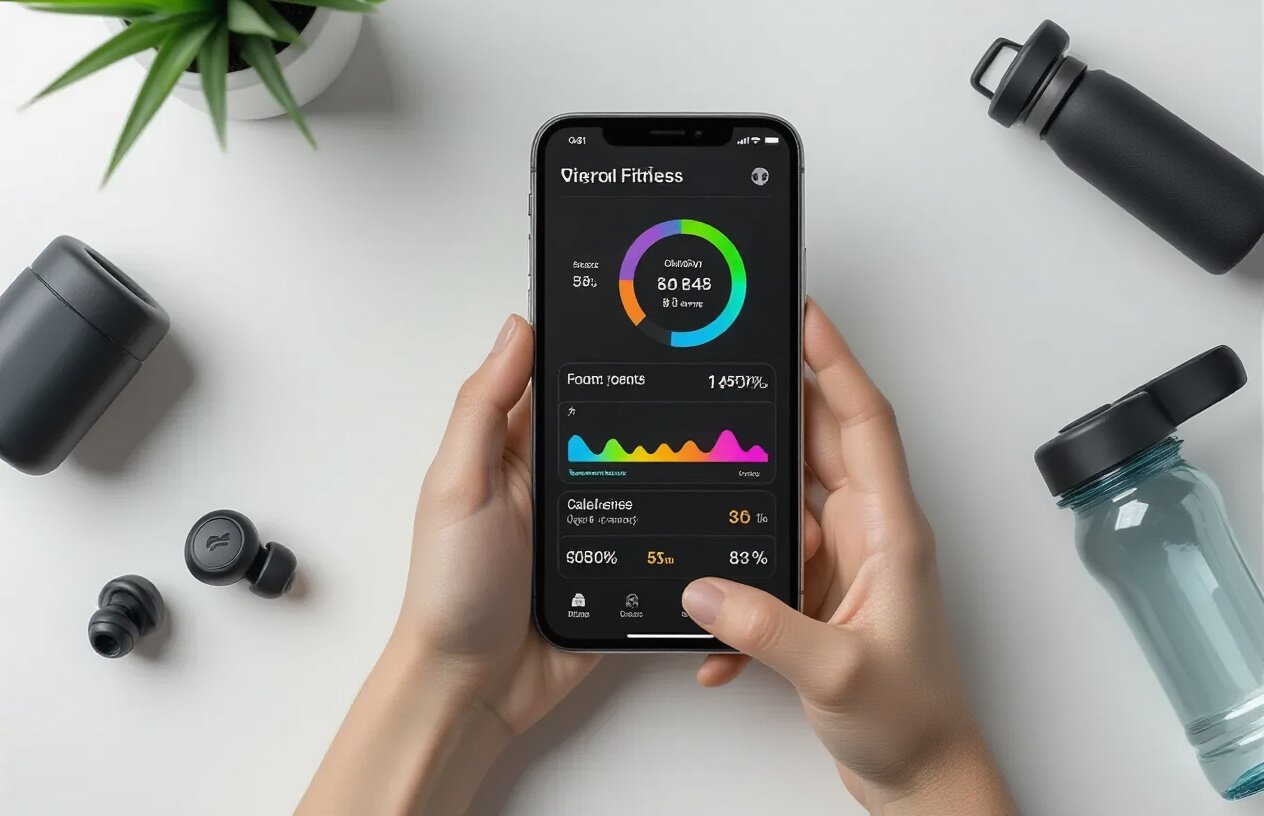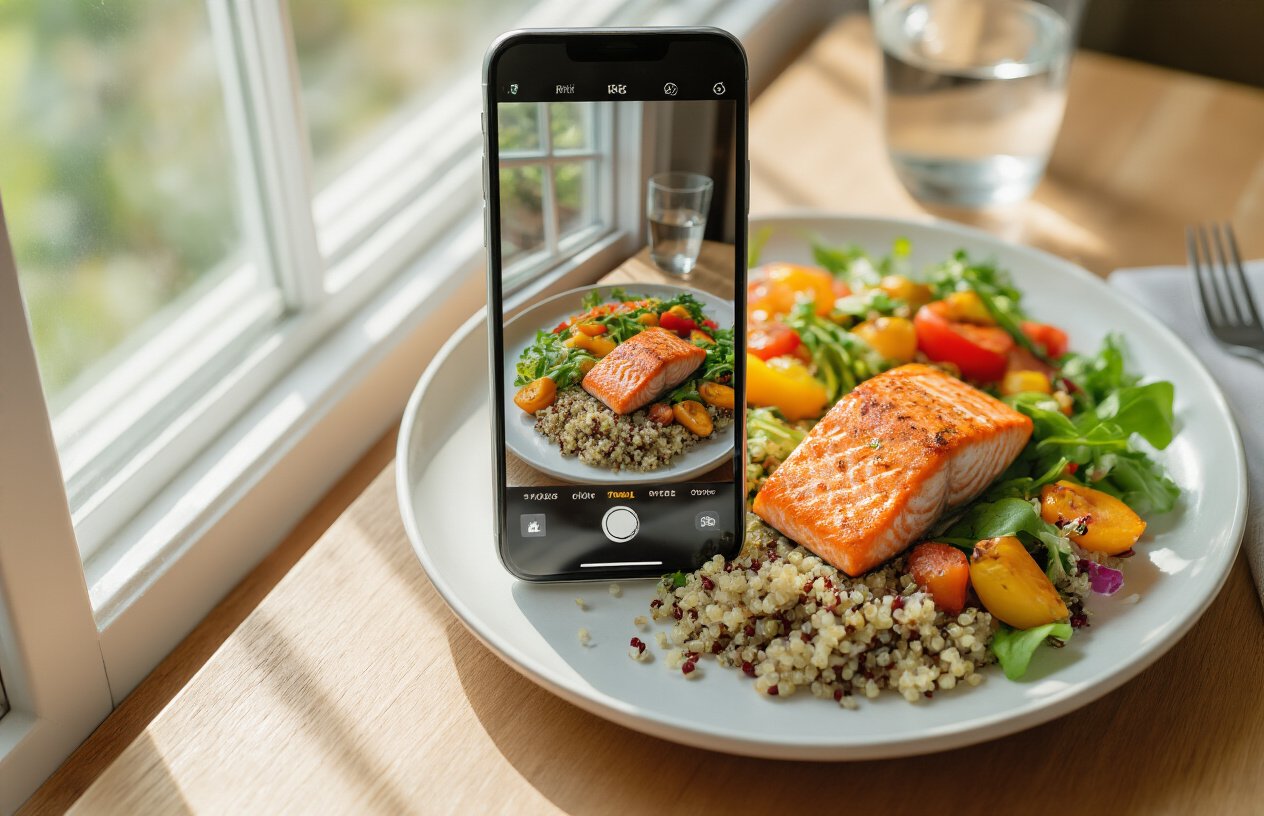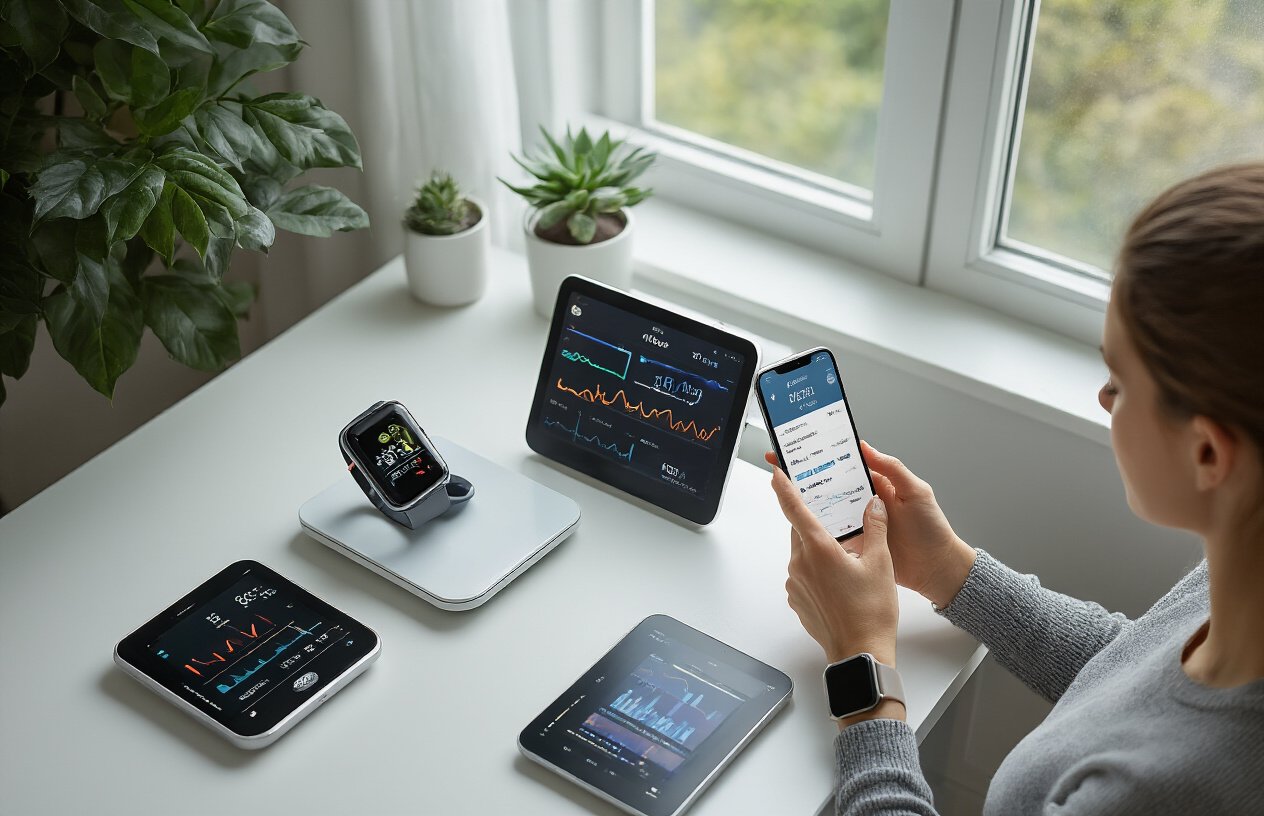Here we will discuss & ways to lose weight using technology. Technology makes losing weight easier, faster, and more sustainable than going it alone. If you’re tired of failed diet attempts and want proven digital tools to finally reach your goals, you’re in the right place.
This guide is for busy people who want to harness weight loss technology without getting overwhelmed by countless apps and gadgets. You’ll discover practical tech-based weight loss methods that fit into your daily routine.
We’ll show you how to leverage social media for weight loss accountability by turning your friends and followers into your personal cheerleading squad. You’ll learn to transform your smartphone into a personal weight loss coach with the right fitness tracking apps and digital diet diary tools. Plus, we’ll explore how joining virtual weight loss support communities gives you anonymous help and motivation 24/7.
Ready to let technology do the heavy lifting in your weight loss journey? Let’s dive in.
Leverage Social Media for Weight Loss Accountability

Leverage Social Media for Weight Loss Accountability
Social media platforms have revolutionized how we approach weight loss technology, transforming traditional support systems into powerful digital weight loss tools. Research from the Arnold School of Public Health at the University of South Carolina demonstrates the effectiveness of online weight loss communities, with a study of 96 obese participants showing that those connected through Twitter lost significantly more weight than participants without social media support. Remarkably, for every tweet users posted about their weight loss journey, they lost approximately half a pound of unwanted fat.
Post your fitness goals publicly on Facebook and Twitter
Making your weight loss and fitness goals public through social media creates concrete accountability that significantly improves your chances of success. By sharing your objectives on platforms like Facebook and Twitter, you’ll benefit from the accountability you feel toward your friends and followers. This public declaration transforms abstract intentions into tangible commitments, making your goals more real and harder to abandon.
The psychological impact of public goal-setting cannot be understated. When you announce your weight loss intentions on social media, you invite encouragement and support from your network, which helps maintain motivation throughout your journey. This exposure and influence from others makes it feel more important to make the right choices and continue your progress, creating a powerful cycle of accountability and motivation.
Build a supportive community of fellow dieters across multiple states
Social media platforms offer unprecedented opportunities to connect with like-minded individuals regardless of geographical boundaries. Using the search function on your chosen social media sites, you can find thriving communities of users and groups with similar interests and goals. Whether you’re interested in a specific diet, workout program, or weight loss approach, these virtual weight loss support networks provide invaluable resources for information sharing and mutual encouragement.
These online weight loss communities function as the digital version of traditional weekly diet groups and exercise clubs. With the right online connections, social media users gain access to accountability, inspiration, and a sense of community that many people need for achieving weight loss goals. The beauty of these digital connections lies in their accessibility – you can receive support and motivation from people across multiple states who understand your struggles and celebrate your victories.
Share daily progress updates and motivational content with friends
Regular status updates serve as a cornerstone of social media accountability for weight loss. Updating your progress at least once a week helps maintain accountability while contributing to your online community. However, it’s important to strike a balance – avoid overwhelming your followers with multiple daily posts that might cause “burnout” among your supporters.
These consistent updates serve multiple purposes in your weight loss technology arsenal. Knowing you need to report your accomplishments reminds you to stick with your healthy habits, while sharing motivational content helps inspire both yourself and others in your network. The act of documenting your journey creates a positive feedback loop where accountability drives better choices, which in turn generates more positive content to share.
Most social media platforms for weight loss maintain positive and encouraging environments, though it’s important to be aware of potential negative interactions. If you encounter online bullying or hurtful comments, report these issues to site administrators, as most social platforms take these concerns seriously and work to maintain supportive communities for their users.
Create Digital Food and Fitness Diaries

Create Digital Food and Fitness Diaries
Start a weight loss blog to document your journey publicly
Creating a public weight loss blog transforms your personal journey into a powerful accountability tool. By documenting your progress openly, you establish a sense of responsibility that goes beyond personal motivation. The act of sharing your experiences publicly creates external pressure to maintain consistency and honesty about your health choices. This digital approach to weight loss technology leverages the power of transparency to keep you committed to your goals.
Public documentation also allows you to receive support and encouragement from readers who may be facing similar challenges. Your journey becomes both a personal record and a source of inspiration for others, creating a virtual community around your weight loss efforts. The regular posting schedule required for maintaining a blog naturally builds the habit of self-reflection and progress assessment.
Take photos of every meal to increase mindful eating
Visual documentation of your meals serves as one of the most effective digital weight loss tools for developing awareness about eating habits. The simple act of photographing food before consumption creates a natural pause that encourages mindful consideration of portion sizes, food choices, and nutritional value. This technique transforms your smartphone into a powerful tool for dietary awareness.
Research shows that people who photograph their meals become more conscious of their eating patterns and make healthier choices over time. The visual record creates an honest representation of actual consumption versus perceived intake, often revealing surprising insights about eating behaviors. This method works particularly well because it requires minimal effort while providing maximum impact on dietary awareness.
Use interactive websites to track weight, exercise, and calories consistently
Interactive fitness tracking apps like MyFitnessPal demonstrate the power of comprehensive digital monitoring systems. With access to over 14 million foods in their database, these platforms make calorie counting and macro tracking incredibly accessible. The convenience of features like barcode scanning and meal photography integration removes traditional barriers to consistent food logging.
These digital diet diary platforms offer customizable dashboards that allow you to focus on specific health metrics relevant to your goals. Whether tracking net carbs for a keto diet, monitoring protein intake for muscle building, or simply counting calories for weight loss, the technology adapts to your specific needs. The ability to connect with over 35 apps and devices creates a comprehensive ecosystem for health monitoring.
The success of these platforms lies in their ability to provide immediate feedback and long-term trend analysis. Users can see daily progress while also understanding broader patterns in their health journey, making it easier to identify what strategies work best for their individual circumstances.
Join Virtual Support Communities for Anonymous Help

Join Virtual Support Communities for Anonymous Help
Now that we’ve explored various tech-based approaches to weight loss, let’s examine one of the most powerful yet underutilized resources: online weight loss communities. These virtual support systems offer a unique combination of anonymity, accessibility, and peer connection that traditional weight loss methods often lack.
Participate in Online Weight Loss Forums and Chat Rooms
Virtual weight loss support communities provide an invaluable platform where individuals can connect with others facing similar challenges without the pressure of face-to-face interactions. These online weight loss communities offer structured membership programs that cater to different commitment levels and experience stages.
Many established platforms offer tiered membership systems, such as Newcomer memberships starting at approximately $70 USD annually (less than $6 per month), providing new members with essential resources, encouragement, and motivation. As participants progress in their journey, they can advance to Trailblazer status at around $60 USD annually, and eventually achieve Legacy membership at $48 USD annually for those committed to long-term success.
These forums create safe spaces where members can share experiences, ask questions, and receive guidance from both peers and experienced community members who understand the unique challenges of weight loss.
Access Free Support Groups Without Leaving Your Home
The convenience factor of virtual weight loss support cannot be overstated. Unlike traditional in-person meetings that require scheduling around specific times and locations, online communities provide 24/7 accessibility from the comfort of your home.
Platforms like Meetup host numerous weight loss support groups with impressive membership numbers – some communities boast over 8,900 exercise partners, while others maintain 7,500+ healthy hikers. These groups span globally, from Perth Exercise and Meditate groups to Las Vegas Overweight Hikers for Health, demonstrating the worldwide reach of digital weight loss support.
The accessibility extends beyond geographical boundaries, allowing individuals in remote areas or those with mobility limitations to participate fully in supportive weight loss communities that would otherwise be unavailable to them.
Learn from Others Facing Similar Weight Loss Challenges
Virtual support communities excel at connecting individuals with shared experiences and goals. Members can access diverse perspectives from people at different stages of their weight loss journey, from newcomers just beginning their transformation to legacy members who have achieved long-term success.
These online weight loss communities often feature specialized groups focusing on specific approaches, such as Weight Loss Surgery support, Weight Loss Without Surgery options, Bariatric Surgery recovery, and Weight & Stress management. This specialization ensures that members receive targeted support relevant to their particular circumstances and chosen weight loss methods.
The collective wisdom available through these platforms provides members with practical strategies, emotional support during challenging periods, and celebration of achievements. Many groups organize virtual challenges and events, such as healthy cooking workshops, fitness activities, and educational sessions, creating a comprehensive support ecosystem that extends far beyond simple discussion forums.
Through technology for losing weight, these communities have revolutionized how individuals access support, making it possible for anyone with an internet connection to join a supportive network dedicated to sustainable wellness and lifelong health goals.
Transform Your Smartphone into a Personal Weight Loss Coach

Transform Your Smartphone into a Personal Weight Loss Coach
Previously, we’ve explored various accountability methods and digital tracking systems. Now that we have covered those foundational approaches, let’s examine how your smartphone can become your most powerful weight loss ally through specialized applications and digital tools.
Download personalized diet apps based on your food preferences
Modern weight loss technology offers AI-powered coaching that adapts to your unique dietary preferences and lifestyle. Advanced smartwatches weight loss apps like those featuring artificial intelligence can provide personalized guidance tailored specifically to your goals. These applications act as your personal dietitian and diet coach, offering customized meal plans that consider your food preferences rather than applying a one-size-fits-all approach.
The most effective digital weight loss tools incorporate behavioral change expertise, providing positive encouragement and motivational coaching that goes beyond simple calorie restriction. These apps focus on building a healthy relationship with food while helping you explore sustainable options that fit your lifestyle. With expert-backed tools and techniques guided by current research from nutrition and behavioral change specialists, these platforms deliver long-term results without rigid food restrictions.
Use calorie counting and restaurant nutrition apps
With this in mind, next, we’ll explore how technology for losing weight extends beyond basic tracking to provide instant nutritional feedback. Revolutionary features like photo-based nutrition analysis allow you to simply capture images of menus, groceries, or meals to receive immediate suggestions and detailed nutritional information.
These fitness tracking apps eliminate the time-consuming process of manually searching for calories or sugar content. Instead, they transform photos into useful nutritional data, recipes, and personalized feedback, making your weight loss journey more enjoyable and less stressful. The technology provides nutrition scores that help you understand how your meals align with your weight loss goals, offering faster answers and more informed food choices.
Try specialized apps for workout training and gym equipment guidance
Tech-based weight loss methods integrate comprehensive fitness tracking alongside nutritional guidance. These applications include activity trackers that monitor physical activity to build fitness as part of your overall weight loss strategy. Many platforms offer built-in workout guidance and motivational daily tips designed to help eliminate obesity while maintaining safety standards.
The most effective weight loss accountability apps provide progress tracking through visual graphs, supporting both metric and imperial measurements. These tools often include hydration trackers to enhance physical and mental wellness, flexible intermittent fasting features, and timely reminders to keep you focused on your fitness, meal tracking, and hydration goals. Additionally, many apps integrate seamlessly with other health tracking applications to sync steps, weight, water intake, and sleep data for comprehensive monitoring.
Establish Digital Communication Chains with Family and Friends

Establish Digital Communication Chains with Family and Friends
Building a strong network of family and friends through digital communication chains creates the accountability and social support that research shows is crucial for successful weight loss. Unlike relying solely on willpower, establishing these virtual weight loss technology systems helps overcome the inevitable setbacks that occur when trying to change health habits long-term.
Set up regular email accountability threads with relatives
Creating structured email accountability threads with family members transforms your weight loss journey into a shared commitment. Set up weekly or bi-weekly email chains where each participant shares their progress, challenges, and victories. These digital weight loss tools work because they provide the accountability factor that makes you more likely to stick to your goals – knowing that relatives are expecting your update creates a gentle pressure to stay on track.
Include specific metrics in your email threads such as weekly weigh-ins, exercise minutes completed, or healthy meals prepared. When family members consistently check in through these structured communications, you’re more likely to power through those tough weeks when enthusiasm runs low. The key is establishing a regular schedule that everyone commits to, whether it’s Sunday evening updates or mid-week progress reports.
Schedule video calls with distant family members for mutual support
Video calling technology offers face-to-face encouragement that goes beyond text-based support. Schedule regular video sessions with distant relatives who share similar health goals, creating virtual weight loss support that mimics in-person accountability. These calls provide the social support element that makes healthy behaviors easier to maintain long-term.
During video calls, celebrate successes together and share strategies for overcoming obstacles. The visual connection helps build confidence – seeing others who are succeeding in their health journey can inspire you to reach new levels. Consider making these calls engaging by walking while talking or sharing healthy meal preparations, turning support into fun, interactive experiences.
Share weekly progress reports and weight loss charts via email
Develop comprehensive weekly progress reports that include weight loss charts, exercise logs, and dietary achievements to share with your family support network. These tech-based weight loss methods create transparency and provide valuable information that helps your support team understand where you need encouragement or practical assistance.
Include visual elements like charts showing weight trends, photos of healthy meals, or screenshots from fitness tracking apps. Family members can offer specific help based on your shared data – perhaps suggesting new healthy recipes when they see you’re struggling with meal planning, or offering to join you for virtual workouts when exercise minutes are low. This systematic approach to sharing progress creates the structured communication necessary for long-term weight loss success.
Utilize Food Photography for Better Diet Awareness

Utilize Food Photography for Better Diet Awareness
Create a visual food diary using your smartphone camera
Your smartphone camera serves as one of the most powerful weight loss technology tools available today, transforming the traditional concept of food journaling into an objective, comprehensive tracking system. Research demonstrates that digital food photography provides a holistic picture of your eating habits, capturing essential details including meal timing, location, and meal quality that written logs often miss. Studies show that 85% of digital food photos are successfully received and maintain sufficient quality for accurate dietary assessment, making this approach both feasible and reliable for long-term digital diet diary implementation.
The visual documentation process eliminates the subjective guesswork inherent in traditional food tracking methods. Unlike manual record-keeping, which often becomes inaccurate over extended periods, photographing your meals creates an unbiased record that reveals patterns you might otherwise overlook. This tech-based weight loss method allows you to capture not just what you eat, but also portion sizes, preparation methods, and eating environments that significantly impact your weight loss journey.
Increase consciousness about food choices before eating
The simple act of preparing to photograph your food creates a powerful moment of mindfulness that can dramatically alter your eating decisions. This pause before consumption naturally increases your awareness of food choices, portion sizes, and meal composition. Research indicates that when individuals know they’ll be documenting their meals visually, they become more conscious of their selections, often leading to healthier choices without additional effort.
Food photography serves as an automatic checkpoint system, forcing you to evaluate your meal before consumption. This brief moment of reflection can reveal whether your plate aligns with your weight loss goals, helping you identify processed foods, inadequate vegetable portions, or oversized servings. The visual preparation process essentially transforms your smartphone into a personal accountability partner, creating natural decision points throughout your day.
Maintain honest documentation of daily eating habits
Visual food diaries provide unprecedented honesty in dietary tracking, eliminating the common tendency to underreport or forget certain foods consumed throughout the day. Photos capture the complete meal context, including side dishes, condiments, and beverages that are frequently omitted from written logs. Research reveals that digital photography successfully documents meal preparation levels, with studies showing average preparation scores and detailed breakdowns of ready-to-eat versus homemade food consumption patterns.
This comprehensive documentation approach reveals crucial patterns in your eating habits that traditional tracking methods miss. Visual records show not only food types but also eating environments, meal timing consistency, and the relationship between different family members’ food choices. The objective nature of photography ensures that your digital weight loss tools provide accurate data for making informed adjustments to your weight loss strategy, creating a foundation of honest self-assessment essential for long-term success.
Track Progress with Technology-Based Monitoring Systems

Track Progress with Technology-Based Monitoring Systems
Digital health tracking tools have revolutionized how individuals approach weight loss, with research from Stanford Medicine demonstrating that consistent monitoring through technology significantly enhances weight loss outcomes. The study analyzed nearly 40 different weight-loss monitoring studies conducted between 2009 and 2019, revealing that three-quarters of participants who used digital weight loss tools more frequently experienced greater weight loss compared to those who monitored less consistently.
Log Weight Measurements Monthly for Long-Term Success
The key to effective progress tracking lies in consistency rather than frequency. Research shows that what matters most is maintaining regular monitoring habits using weight loss technology. Digital tools make this process more engaging by tapping into competitive instincts and providing visual cues that indicate proximity to goals. For instance, fitness tracking apps often display colorful progress circles showing step count completion or weight loss milestones.
Monthly weight logging through digital platforms provides several advantages over traditional handwritten records. These tech-based weight loss methods automatically store historical data, create visual progress charts, and eliminate the burden of manual calculations. The Stanford study found that individuals using digital monitoring tools were more consistently active and engaged compared to those using traditional tracking methods.
Use Personalized Websites That Provide Tailored Nutrition Information
Digital diet diary platforms have transformed nutrition tracking by eliminating the tedious work of manual calorie counting. These smartphone weight loss apps already contain comprehensive nutritional databases, automatically calculating grams of carbohydrates, fats, and proteins for logged foods. Advanced features like barcode scanning and smart camera technology allow users to simply photograph meals, with the app handling the nutritional analysis.
Macro tracking capabilities enable users to set personalized macronutrient goals, ensuring adequate protein intake while monitoring carbohydrate and fat consumption. Water tracking features help users meet daily hydration recommendations, while patterns and reports provide behavioral insights delivered directly to users’ inboxes. Device integration with Apple Health and Google Fit streamlines exercise tracking, creating comprehensive health profiles.
Access Expert Advice From Nutrition and Exercise Professionals Online
The Stanford research revealed an encouraging finding for individuals seeking independent weight loss solutions: in-person coaches weren’t necessary for maintaining engagement in digital weight loss tools. This discovery opens opportunities for people to access professional guidance through technology-based platforms without requiring face-to-face consultations.
Online platforms provide access to nutrition and exercise expertise through various digital channels, making professional advice more accessible than ever before. The study emphasized that regardless of what individuals monitored—whether weight loss, calories, or exercise—consistent use of weight loss technology produced better results. This flexibility allows users to focus on tracking methods that align with their preferences while still accessing expert-designed programs and recommendations through digital platforms.

Technology has transformed weight loss from a solitary struggle into a connected, supported journey. From leveraging social media accountability and virtual communities to utilizing smartphone apps and digital food diaries, these seven technological approaches provide the tools and motivation needed to achieve lasting results. Research consistently shows that people who use technology for weight tracking and support are more likely to stick to their goals and maintain their progress over time.
The key to success lies in finding the right combination of digital tools that match your lifestyle and preferences. Whether you’re photographing your meals, joining online support groups, or creating email chains with family members, technology offers unprecedented access to motivation, accountability, and expert guidance right at your fingertips. Start with one or two methods that resonate with you, and gradually incorporate others as you build momentum on your weight loss journey.






This article offers great insights! The practical tech tips, like food photography and interactive apps, are incredibly helpful for staying accountable and making mindful choices on my weight loss journey. Very informative!